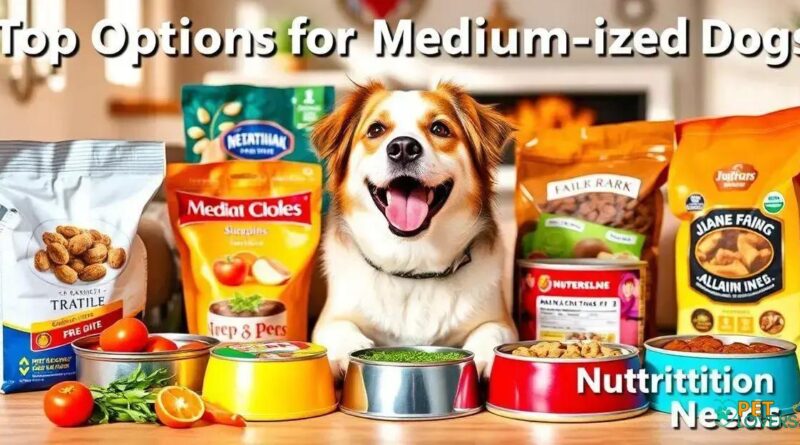What’s the Best Food for Medium-Sized Dogs? Discover the Top Options!
Choosing the right food for your medium-sized dog involves understanding their specific nutritional needs based on breed, age, and health conditions. A balanced diet can prevent health issues and promote longevity. It’s recommended to feed them twice daily and offer healthy treats. Always consult your veterinarian for personalized dietary advice.
As a responsible dog owner, you want to ensure your medium-sized dog is getting the nutrients they need to thrive.
With so many dog food options on the market, it can be overwhelming to choose the best one for your furry friend.
In this article, we’ll explore the top dog foods for medium-sized breeds, covering their nutritional needs, and provide tips on how to feed your dog for optimal health.
Choosing the Right Food for Your Medium-Sized Dog
When it comes to choosing the right food for your medium-sized dog, it’s essential to consider their breed, age, and health conditions.
A high-quality dog food should provide the necessary nutrients for optimal health, including protein, fat, carbohydrates, vitamins, and minerals.
Look for dog foods that are made with wholesome ingredients, are easily digestible, and contain no artificial preservatives or additives.
Consult with your veterinarian to determine the best food for your medium-sized dog, as they can provide personalized recommendations based on your dog’s specific needs.
With the right food, you can help your dog thrive and live a long, healthy life.
The Best Dog Foods for Medium-Sized Breeds
When selecting the right food for your medium-sized dog, it’s crucial to consider their individual needs, breed, age, and health conditions. Look for dog foods that are formulated specifically for medium-sized breeds, as they require a balance of nutrients to support optimal health.
Some of the best dog foods for medium-sized breeds include Orijen Adult Dog Food, Blue Buffalo Life Protection Formula Adult Dog Food, and Merrick Grain-Free Adult Dog Food. These high-quality dog foods are made with wholesome ingredients, are rich in protein and fat, and contain no artificial preservatives or additives.
Medium-sized dogs require a balanced diet that meets their unique nutritional needs. This includes protein from animal sources, fat for energy, carbohydrates for fiber and digestion, vitamins, and minerals. It’s essential to choose a dog food that meets these nutritional needs, as a deficiency or excess of any nutrient can lead to health problems.
To ensure your medium-sized dog is getting the nutrients they need, feed them twice a day, morning and evening. Divide their daily ration into 2-3 meals if they have a sensitive stomach. Also, consider adding healthy treats, such as carrots and green beans, to their diet to provide mental stimulation and reward good behavior.
Medium-sized dogs are prone to certain health issues, including hip dysplasia, patellar luxation, and eye problems. Regular veterinary check-ups, a balanced diet, and plenty of exercise can help prevent or manage these conditions. Consult with your veterinarian to determine the best course of action for your medium-sized dog’s specific needs.
Nutritional Needs for Medium-Sized Dogs
A medium-sized dog’s nutritional needs are unique and must be met to ensure optimal health. They require a balanced diet that includes protein from animal sources, fat for energy, carbohydrates for fiber and digestion, and essential vitamins and minerals. A deficiency or excess of any nutrient can lead to various health problems, making it crucial to choose a dog food that meets their needs.
Moderate-sized dogs are prone to certain health issues, including hip dysplasia, patellar luxation, and eye problems. Regular veterinary check-ups, a balanced diet, and plenty of exercise can help prevent or manage these conditions. Consult with your veterinarian to determine the best course of action for your medium-sized dog’s specific needs, and take steps to maintain their overall health and well-being.
Feeding Your Medium-Sized Dog: Tips and Tricks
When it comes to feeding your medium-sized dog, it’s essential to provide them with a balanced diet that meets their unique nutritional needs. Here are some tips and tricks to help you get it right:
Feed them twice a day, morning and evening, to ensure they’re getting the nutrients they need. Also, consider dividing their daily ration into 2-3 meals if they have a sensitive stomach.
Additionally, add healthy treats like carrots and green beans to their diet to provide mental stimulation and reward good behavior.
Common Health Issues in Medium-Sized Dogs
Moderate-sized dogs are prone to certain health issues, including hip dysplasia, patellar luxation, and eye problems. Regular veterinary check-ups, a balanced diet, and plenty of exercise can help prevent or manage these conditions.
Consult with your veterinarian to determine the best course of action for your medium-sized dog’s specific needs, and take steps to maintain their overall health and well-being.
Additionally, consider providing a comfortable and stable living environment, as stress can exacerbate health issues.
By staying informed and taking proactive measures, you can help your medium-sized dog live a long and healthy life.
By understanding the unique needs of your medium-sized dog, choosing the right food, and being aware of common health issues, you can help them live a long and healthy life.
Remember to stay informed, consult with your veterinarian, and take proactive measures to ensure your dog’s overall well-being.
With the right approach, you can build a strong bond with your medium-sized dog and enjoy many happy years together.
Frequently Asked Questions about Artificial Intelligence for Small Business
What are the benefits of automating tasks for my small business?
Automating tasks frees up your team from repetitive activities, increasing productivity and allowing them to focus on more strategic tasks.
What tools can I use for data analysis?
There are various tools available, such as Google Analytics, Tableau, and Microsoft Power BI, that help collect and interpret valuable data.
What are chatbots and how do they improve customer service?
Chatbots are virtual assistants that can answer questions and solve problems at any time, improving customer experience and freeing up your team.
How can I personalize customer experience?
Through data analysis, you can better understand customer preferences and offer personalized recommendations and promotions.
Why is customer feedback important?
Feedback is essential to identify areas that need improvement and adjust your strategy to ensure customer satisfaction.
Is artificial intelligence accessible for small businesses?
Yes, there are various AI solutions that are accessible and scalable, allowing small businesses to improve efficiency and customer service.





